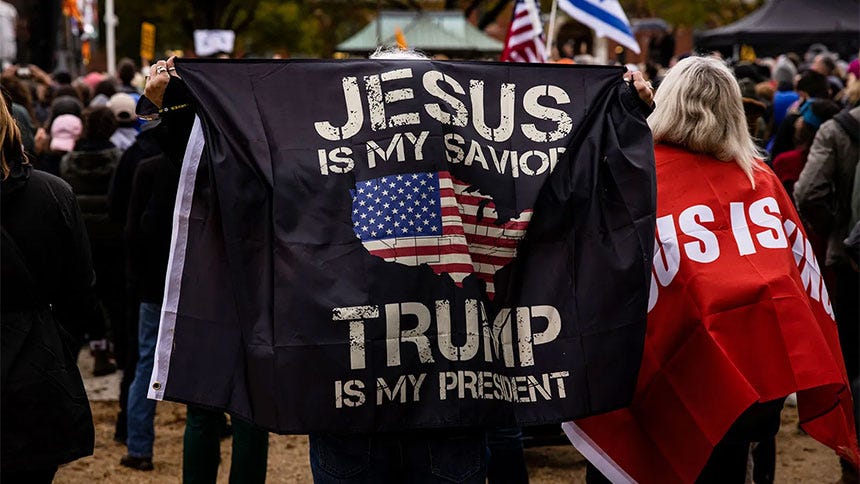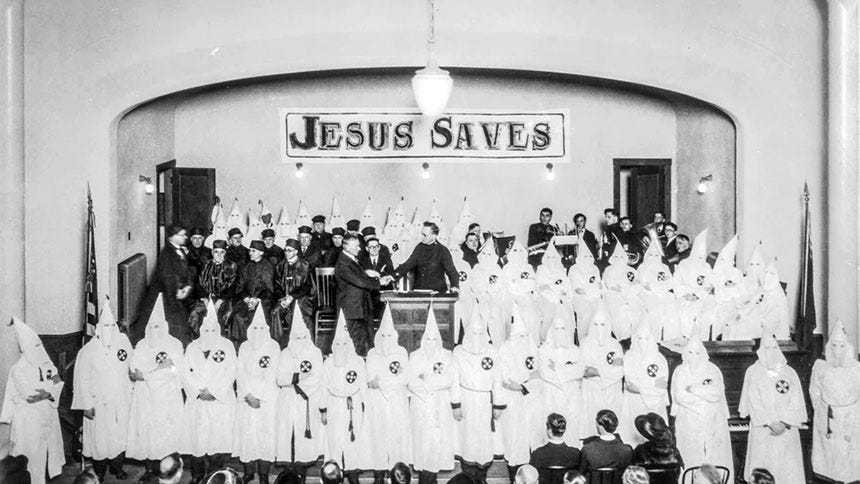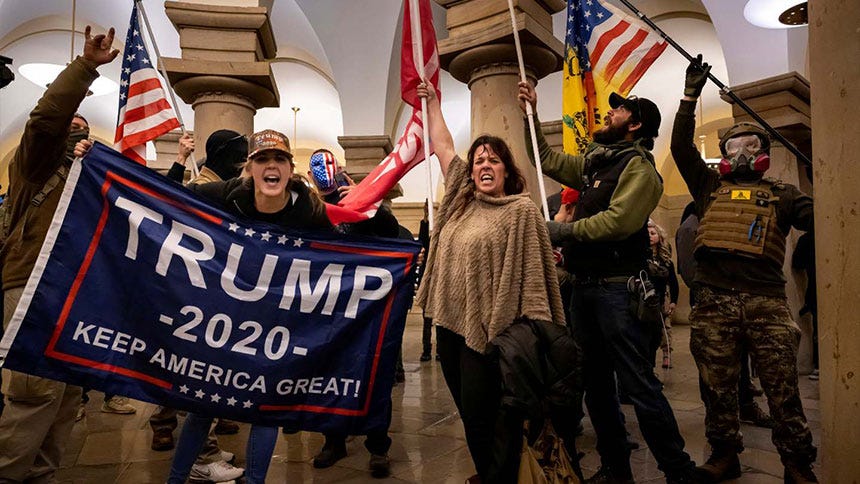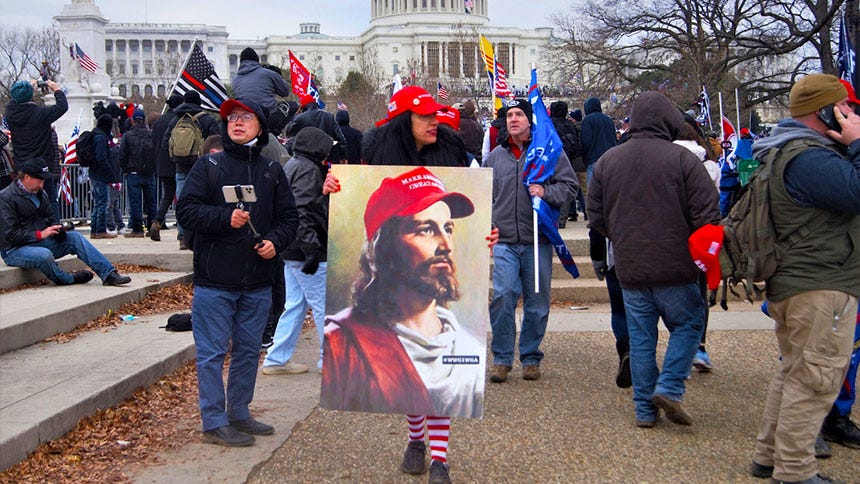Christian nationalism has deep historical roots, but its development into the powerful and destructive force it is today is a result of complex social, political, and religious dynamics. In this edition of POP 'N' PIZZA, we're looking at the origins of Christian nationalism and its resurgence in contemporary politics.
Early Christian Nationalism: The Foundation
Christian nationalism's foundation lies in the European concept of Christendom, where Christian identity was inseparable from national and cultural identity. In medieval Europe, rulers were seen as protectors of the faith, and the Church wielded significant influence over political matters. The idea of a nation being divinely favored or chosen was prevalent, with monarchs often claiming divine right to rule.
Puritans and other settlers who saw the New World as a land of divine opportunity brought this concept to America. The Puritans, in particular, believed they were creating a "city upon a hill” — a new Israel ordained by God. This vision of America as a Christian nation with a special covenant with God laid the groundwork for Christian nationalism in the U.S.
19th Century: Manifest Destiny and Racial Ideology
In the 19th century, the idea of Manifest Destiny — believing that God destined the United States to expand across North America — was a powerful expression of Christian nationalism. This belief justified the displacement of Native Americans and the annexation of vast territories. It was often couched in religious language, portraying American expansion as a divine mission to spread Christianity and civilization.
During this period, Christian nationalism also began to intertwine with racial ideologies. The belief that white Anglo-Saxon Protestants were God's chosen people led to the marginalization and oppression of other races and religious groups. This racialized form of Christian nationalism became a cornerstone of groups like the Ku Klux Klan.
The Ku Klux Klan and Christian Nationalism
The Ku Klux Klan (KKK), founded in the aftermath of the Civil War, is one of the most infamous expressions of Christian nationalism in American history. The Klan saw itself as a defender of white Protestant America against perceived threats from African Americans, Catholics, Jews, and other groups. The Klan's ideology was steeped in a twisted version of Christian theology that justified racial violence and segregation.
The second iteration of the Klan, which emerged in the early 20th century, was even more explicitly tied to Christian nationalism. It portrayed itself as a Christian organization committed to defending American values, which it equated with white Protestant supremacy. The Klan was not only a secret society but also a powerful political force, influencing elections and spreading its ideology across the country.
The Klan's use of Christian symbols, such as the burning cross, and its rhetoric of defending "Christian civilization" deeply ingrained Christian nationalist ideas in certain segments of American society.
The Cold War and the Rise of Religious Conservatism
The Cold War era marked a significant turning point for Christian nationalism in the United States. As the U.S. positioned itself as a Christian nation standing against the atheist Soviet Union, religion became an essential element of American identity. This period saw the addition of "In God We Trust" on currency (1956) and "under God" in the Pledge of Allegiance (1954), reinforcing the idea that the U.S. was a Christian nation.
During the 1970s and 1980s, the rise of the Religious Right further cemented Christian nationalism in American politics. Evangelical leaders like Jerry Falwell and Pat Robertson mobilized conservative Christians to become a powerful voting bloc, advocating for policies based on their interpretation of Christian values. Issues like abortion, school prayer, and same-sex marriage became central to the Christian nationalist agenda.
The Religious Right's influence grew as it aligned with the Republican Party, leading to a political landscape where Christian nationalist ideas became increasingly mainstream. This period also saw the rise of Christian broadcasting networks and schools, further spreading Christian nationalist ideology.
Christian Nationalism in the 21st Century: From the Fringe to the Mainstream
In the 21st century, Christian nationalism has experienced a resurgence, particularly within the context of right-wing populism, blending religious nationalism with nativism, xenophobia, and opposition to multiculturalism. The election of Donald Trump in 2016 was a watershed moment for modern Christian nationalism, as many of his supporters viewed him as a defender of Christian values against secularism and liberalism.
Trump's rhetoric often invoked Christian nationalist themes, such as the idea of restoring America to its former greatness, which many of his followers interpreted as returning to a more Christian, white-dominated society. The support of prominent evangelical leaders and organizations further legitimized Christian nationalism within the political mainstream.
The January 6, 2021, Capitol riot was a stark example of how Christian nationalism has become a driving force in American politics. Many of the rioters carried Christian symbols and invoked religious language, seeing their actions as part of a divine mission to "save" America.
Global Christian Nationalism and Its Modern Manifestations
Christian nationalism is not unique to the United States. Similar movements have gained traction in countries like Russia, Hungary, and Brazil, often tied to right-wing populism. These movements typically emphasize the importance of Christian identity in defining the nation and oppose secularism, immigration, and other perceived threats to traditional values.
In Russia, for example, President Vladimir Putin has positioned himself as a defender of Orthodox Christianity, aligning the Russian state closely with the Church. This has reinforced a national identity that views Russia as a bulwark against Western secularism.
In Hungary, Prime Minister Viktor Orbán has promoted a vision of Hungary as a Christian nation that must be defended against Muslim immigration and liberal European values. Orbán's government has used Christian nationalist rhetoric to justify policies that restrict immigration and suppress opposition.
Why Christian Nationalism Must Die
Christian nationalism can lead to a range of negative consequences that affect society, politics, and religious freedom:
Erosion of Religious Freedom
Christian nationalism promotes the idea that a particular nation should be governed according to Christian principles, which can marginalize or exclude people of other religions or those with no religious beliefs. This undermines the principle of religious freedom, a cornerstone of democratic societies, where people are supposed to have the right to practice any religion or none at all without government interference.
Exclusionary and Intolerant
By defining national identity in explicitly Christian terms, Christian nationalism tends to exclude those who do not fit that identity — be they non-Christians, secular individuals, or even Christians who hold different views. This exclusion can foster intolerance and division within society, leading to discrimination against religious minorities, immigrants, and others who are seen as outsiders.
Undermines Democracy
Christian nationalism can conflict with democratic principles by promoting the idea that certain religious beliefs should guide government policy and law, rather than the will of the people as expressed through democratic processes. This can lead to theocracy-like tendencies, where religious leaders or doctrines hold sway over political decisions, undermining the separation of church and state.
Promotes Authoritarianism
Historically, Christian nationalism has often been associated with authoritarianism. The belief that a nation is divinely chosen can justify the suppression of dissent and opposition, as those who disagree with the ruling ideology may be seen as not just political opponents but enemies of God. This can lead to authoritarian practices, such as censorship, repression of free speech, and the persecution of religious or political minorities.
Fuels Extremism and Violence
Christian nationalism can foster extremist ideologies by framing political and cultural conflicts in apocalyptic or cosmic terms. This can lead to the justification of violence against those who are perceived as enemies of the faith or the nation.
Distorts Christianity
Christian nationalism distorts the teachings of Christianity by conflating the faith with political power and national identity. Christianity, as taught by Jesus, emphasizes love, humility, and care for the marginalized, while Christian nationalism emphasizes the exact opposite.
Polarizes Society
Christian nationalism often deepens societal divisions by framing political issues in stark, black-and-white terms, where one side is aligned with God and the other with evil. This polarization can make compromise and dialogue more difficult, leading to a more divided and hostile political environment.
Threatens Global Peace
When Christian nationalism is tied to foreign policy, it can lead to conflicts with other nations, particularly those with different religious identities. Viewing international relations through a religious lens can contribute to global tensions, as it may encourage a confrontational approach to non-Christian countries, potentially leading to religiously motivated wars or conflicts.
Challenges Pluralism
Modern democratic societies are typically pluralistic, meaning they accommodate a diversity of beliefs and identities. Christian nationalism challenges this pluralism by advocating for a singular national identity centered on a particular interpretation of Christianity. This can erode the cultural and religious diversity that enriches societies and contributes to their dynamism and creativity.
Undermines Public Trust
When governments or political leaders align too closely with a particular religious ideology, it can erode public trust in institutions. People may feel that the government serves only a specific group rather than the common good, leading to alienation, disenfranchisement, and cynicism about the political process. Sound familiar?
I leave you with this powerful sermon against Christian nationalism from James Talarico, the grandson of a Baptist pastor from South Texas and a member of the Texas House of Representatives.
"If this was truly a Christian nation, we would forgive student debt. If this was truly a Christian nation, we would guarantee healthcare to every single person. If this was truly a Christian nation, we would love all of our LGBTQ neighbors. If this was truly a Christian nation, we would make sure every child in this state and in this country was housed, fed, clothed, educated, and insured.
If this was indeed a Christian nation, we would never make it a Christian nation, because we know the table of fellowship is open to everyone, including our Buddhist, Hindu, Jewish, Muslim, Sikh, and Athiest neighbors."







